Janja Garnbret Wins Olympic Boulder Final, Raboutou Second

Janja Garnbret (Slovenia) has won the women’s Women’s Boulder final by being the only competitor to top the first two boulders.
Garnbret, Miho Nonaka, Akiyo Noguchi, Brooke Raboutou and Jessica Pilz: all finalists who could be considered bouldering specialists (perhaps along with being a Lead specialist). That amounts to one helluva competitive field.
We could expect the top three placing boulderers from the qualification round—Garnbret, Raboutou, and Noguchi—to be looking for repeat performances. Garnbret and Noguchi especially, given their long standing competitive presences atop Bouldering World Cup podiums. Although 20-year-old Raboutou has put in less time on the circuit, a strong finish from her would also be unsurprising: she medaled at two out of the three Bouldering World Cups this year.

The Lay of the land
The sun was setting behind the wall. At 86 degrees Fahrenheit and 69% humidity, the threat of rain hung in the air.
Boulder one: A slab traverse, starting with a heinous small, flat crimp (think of a pancake, and likely just as greasy), followed by palm press suspension move. Part of the challenge of this boulder was reading it correctly. Routesetters predicted this to be the hardest of the three.
Boulder two: The setters intended for the athletes to start facing the crowd. After contorting through a series of volumes, they’d eventually turn back around to find the top.
Boulder Three: A series of dual-textured holds (mostly slopers) snaked across the wall, resulting in a power-endurance pump fest. Precision was a prerequisite for a top on this one.
What Happened?
Anouck Jaubert cheated what the routesetters intended on the first boulder to stick the zone on her second go. Out of her element, Jaubert’s creativity was an inspiration. Rather than doing a palm press, she simply pulled a high foot and essentially did a piston squat to gain the next hold. For context, Bouldering specialist Miho Nonaka was unable to find the zone. Noguchi stuck the zone only after five attempts.
Noguchi was the first athlete to unlock the intended sequence on the first boulder. It was particularly thrilling to watch after seeing so many greats before her try and be unsuccessful.
In a heartbreaking moment, Brooke Raboutou found the zone of the first boulder in the last minute. She flashed the second half of the boulder, nearly to the top. She slipped right before securing the match. In the end, only Garnbret walked away from boulder number one with a top.
The second boulder proved to be just as tricky as the first. Miroslaw, Jaubert and Seo made no progress. Pilz only just achieved the zone. Nonaka, despite not doing the intended crowd-facing start, sailed from the zone toward the finish, but slipped as she tried to gain a foot.
In a second heartbreaking moment, Rabouto found her way to the same spot as Nonaka, but she timed out going for the finish. Once again, Garnbret was the only athlete to top. With that, she had already won the round, making for a slightly anticlimactic finish.
The third boulder was perhaps a bit too hard. Miroslaw, Jaubert, Pilz, Seo, and Noguchi made no scorable progress. Nonaka was quick to find the zone, but appeared too tired for a top. Raboutou, in finding the zone, secured her a second place finish for the round. And Garnbret? Sadly no top, although she was the only athlete to flash to the zone.
Implications
Moving into the final event, Lead, Garnbret is seated in first, with a Combined score of 5 points. Behind her is Miroslaw and Noguch, with 8 and 9 points, respectively. Raboutou is in fifth, with a score of 14.
The Lead specialists to look out for are Garnbret, Seo, Pilz, and Raboutou.
WOMEN’S SPORT CLIMBING BOULDER FINAL RESULTS
- Janja Garnbret (Slovenia)
- Brooke Raboutou (USA)
- Miho Nonaka (Japan)
- Akiyo Noguchi (Japan)
- Jessica Pilz (Austria)
- Anouck Jaubert (France)
- Seo Chae-hyun (South Korea)
- Aleksandra Miroslaw (Poland)
MEET THE WOMEN’S SPORT CLIMBING OLYMPIC FINALISTS
Janja Garnbret (Slovenia)
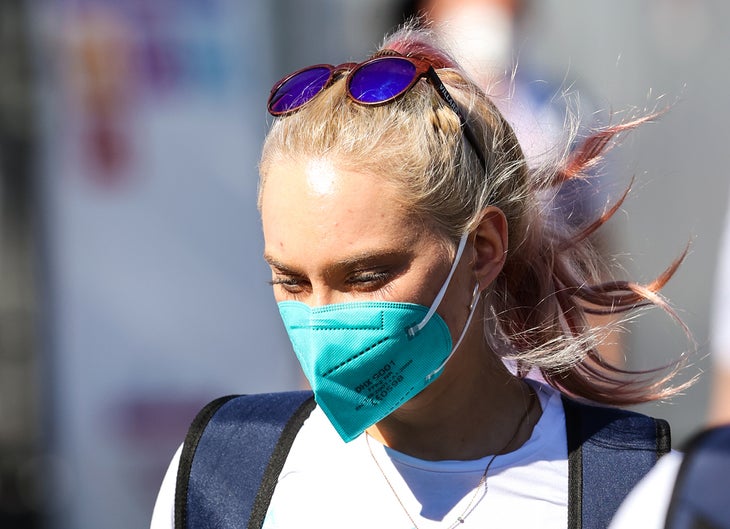
Though just 22 years old, Janja Garnbret is already one of the most pedigreed competition climbers of all time. Since her first appearance on the adult World Cup circuit in 2015, the Slovenian has been the competitor to beat in both lead and bouldering. In 2019, she swept the bouldering World Cup series and won the World Championships in both bouldering and lead.
In this week’s qualifying rounds, Garnbret—who is not a speed specialist—climbed somewhat sloppily in both speed heats, leading the announcers to speculate whether the pressure of the Olympic stage was getting to her. Those theories were thoroughly debunked in the bouldering round, where Garnbret was dominant, flashing all four problems with evident ease. (No other competitor even topped all four.) Her prowess on the boulders more than compensated for her relatively disappointing 4th place finish in lead. It’s a strong field, but Garnbret is certainly a gold medal favorite here, especially after winning Boulder in today’s finals round at the Olympic Games in Tokyo.
Seo Chae-hyun (South Korea)
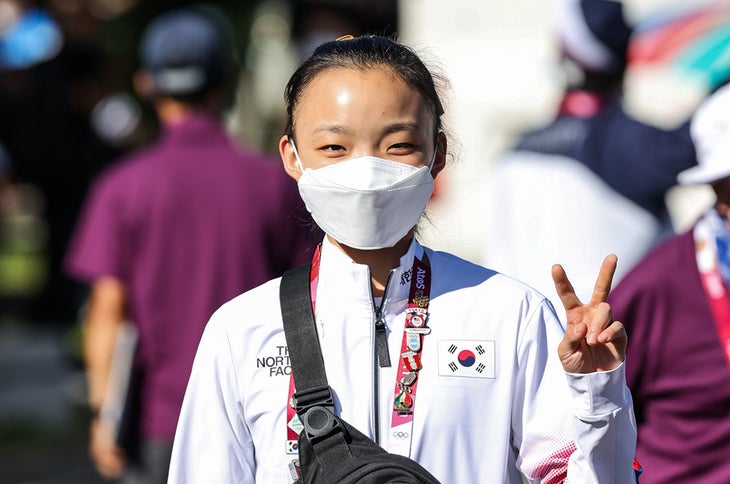
At 17, Seo Chae-hyun is one of climbing’s youngest Olympians (though not the youngest: she’s got a month on Colin Duffy). Because of her age and her limited exposure to competitions over the last 18 months, many people were unsure what to expect from Chae-hyun in the Olympics. She is recognized as a gifted lead climber—in 2019, her first season on the adult circuit, she medaled in six lead events, taking four golds, one silver, and one bronze—but until Tuesday’s qualifying round, her bouldering and speed capabilities remained largely untested on the international stage.
What did we learn during the qualifiers? We learned that speed isn’t her forte (she placed 17th) but that she’s a dang strong boulderer. Her 5th place finish on the boulders set her up nicely for her main event, lead, which she won with style, finding elegant beta through burly sequences that stymied many of the world’s strongest competitors. Can she medal? Absolutely.
(Fun fact: Chae-hyun doesn’t just climb inside; when she was 14, she took a trip to Colorado and took down one of Rifle’s hardest routes: Bad Girls Club, 5.14d.
Miho Nonaka (Japan)
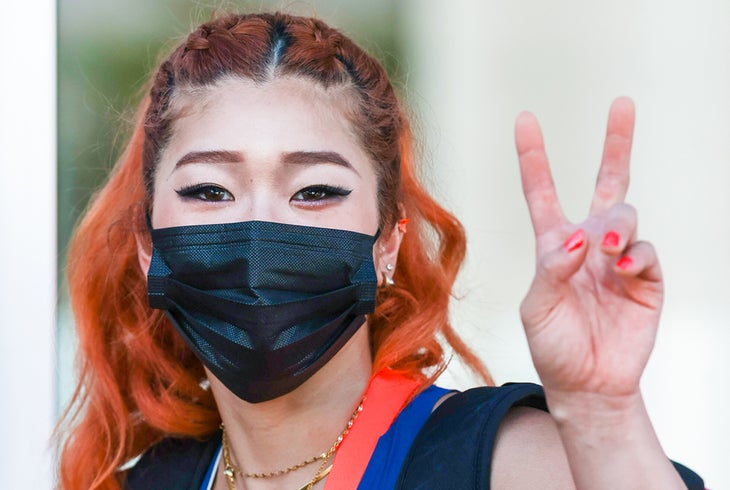
Born in Tokyo in 1997, Miho Nonaka started climbing at the age of eight; according to her website, her main motivation to improve was her desire to out-perform her two older sisters. She succeeded. She competed in her first World Cups in 2014, won her first boulder World Cup in 2016, and for the next few years racked up a hefty collection of medals, eventually winning the overall Bouldering World Championship in 2018. Known as an adept all-arounder, Nonaka clearly demonstrated her medal-potential during the qualification round, placing 4th in speed, 8th in bouldering, and 3rd in lead.
Akiyo Noguchi (Japan)
Born in Tokyo in 1989, Noguchi started climbing at the age of 11—training mostly on a home wall her father built on their family’s cattle farm. At age 32, she’s a seasoned competitor. She began winning World Cup medals in 2007 and won at least three each year after that until COVID-19 disrupted the 2020 season. In her home country, Noguchi is something of an elder statesmen; she won nine consecutive Bouldering Japan Cups, from 2005 to 2014.
Like Adam Ondra, Noguchi is has traditionally performed far better in bouldering and lead climbing than in speed, a disadvantage in the combined format. But evidently she’s been training: during the qualification round she managed a respectable 9th place (compared to Ondra’s 18th). This took some of the pressure off the bouldering and lead rounds, in which she placed 3rd and 6th, respectively. Noguchi has said that she will retire from competition climbing at the end of these Games.
Brooke Raboutou (U.S.)
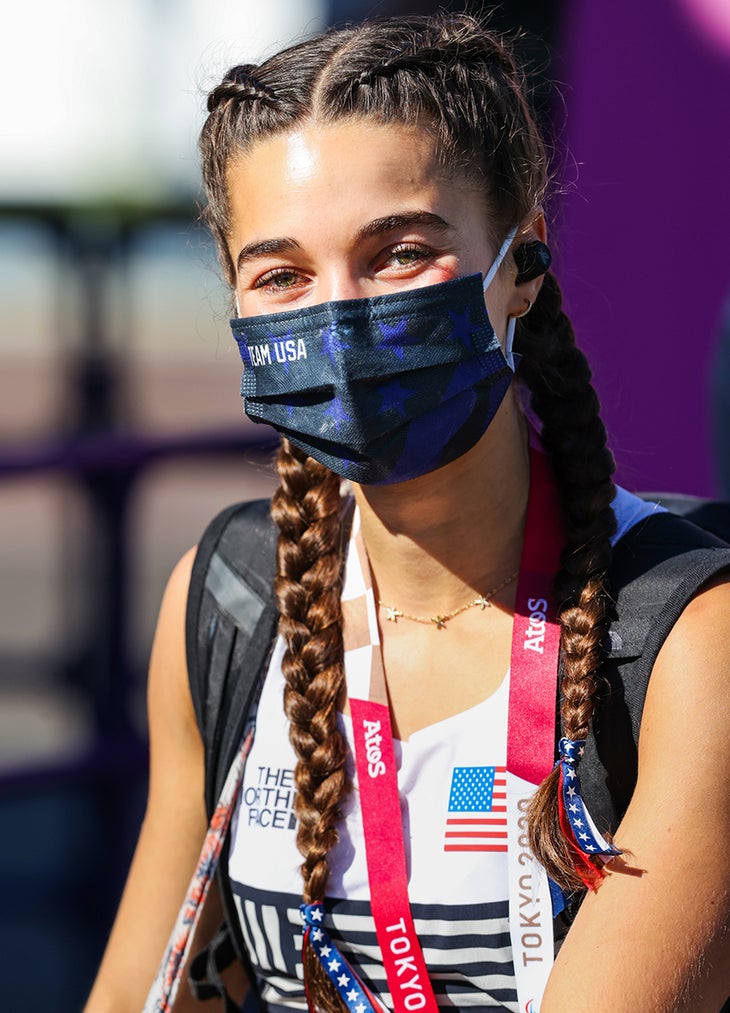
Brooke Raboutou was born in 2001 to a climbing family. Her parents were leading competitors during the 90s and are the masterminds behind ABC Kids Climbing—a program that also produced fellow Olympian Colin Duffy—and her younger brother is currently one of the world’s strongest outdoor boulderers. Raboutou was climbing V10 and 5.13b by age nine; she sent her first 5.14b at age eleven; last year, when the Olympics were postponed, she sent two V14 boulder problems, Muscle Car and Jade, both in Colorado. Earlier this year, in preparation for the Olympics, she took a semester off from college—she’s a marketing major at the University of San Diego—and focused on training. It seems to have paid off. During Olympic qualifiers, she placed 12th in speed, then absolutely crushed it on the boulders, gaining three tops (two of them flashes) and a zone. Her 2nd place finish in bouldering took some pressure of lead, where she placed 8th.
Jessica Pilz (Austria)
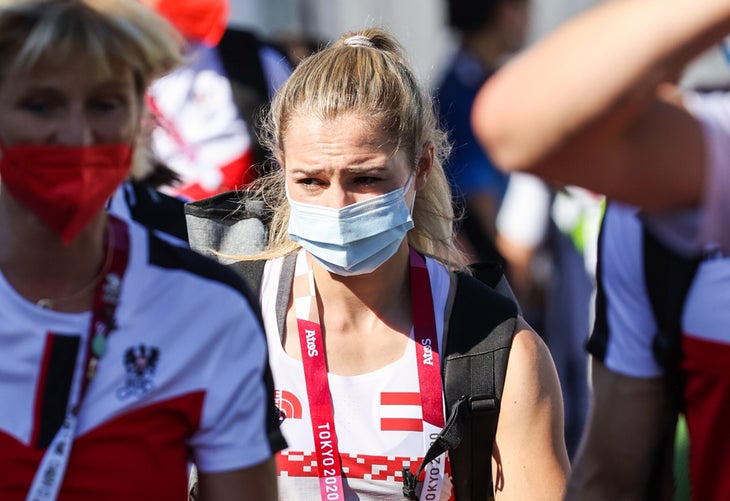
Hailing from Haag, Austria, Jessica Pilz started climbing when she was just nine years old. Now 24, she’s one of the most accomplished lead climbers in the women’s field, and she has also made finals in six Bouldering World Cups. In 2018, she won the Lead Climbing World Championship—beating Janja Garnbret on time. Like Raboutou, Pilz is both a university student and a professional athlete, and she “aims to become a role model for the next generation of climbers.” Unfortunately, Pilz fully ruptured her A-4 pulley at a Bouldering World Cup in Salt Lake City in late May—an injury that has undoubtedly forced her to balance the requirements of recovery with those of training. But it seems to have worked. She had tape on her finger during qualifiers, but climbed well, especially in lead where she finished 2nd. She was 11th and 9th in speed and bouldering.
Aleksanda Miroslaw (Poland)

Aleksanda Miroslaw is the reigning women’s speed-climbing World Champion, and winner of the Olympic Speed Finals, where she also set a new world record. And she is obviously fast. During her best heat during qualifiers, she came short of the women’s speed world record by just .01 seconds. She’d have liked that 1/100th of a second, but even without it she won first in speed, which has carried her to the final. Miroslaw is the quintessential speed specialist, but doesn’t perform at the same level on the boulders (20th in qualifiers) and the lead wall (19th). To medal, she’ll need to win speed, which she did, and then make some gains in the non-speed events.
Anouck Jaubert (France)
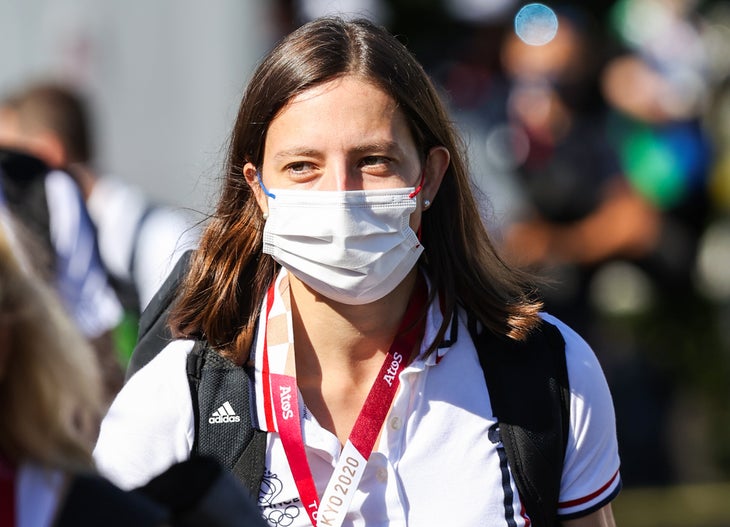
Anouck Jaubert is a 27-year-old speed specialist from Grenoble, France. She has appeared on dozens of World Cup podiums as a speed climber, and she earned her spot on the French team after an 11th place finish in the combined event at the 2019 World Championships in Hachioji, China. In the speed round of the Olympic qualifier, Jaubert posted a time of 7.12 seconds, second only to Miroslaw. Jaubert followed up this strong speed performance by placing 13th in bouldering and 15th in lead. We’ll expedted a battle between Miroslaw and Jaubert for the speed title in finals—and with it the chance to podium—and that’s how it played out, with Jaubert taking second and Miroslaw first.
The post Janja Garnbret Wins Olympic Boulder Final, Raboutou Second appeared first on Climbing.

